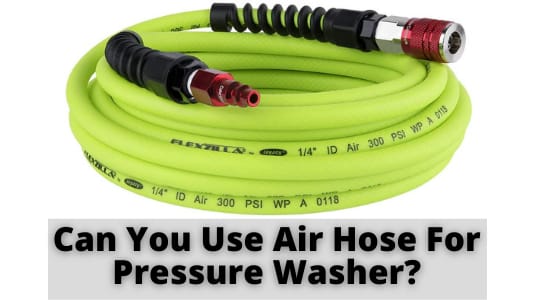A pressure washer is generally used for cleaning dust, loose painting, grime, mud, and any other dirty surface using high-pressure water flow. High-capacity pressure pumps are used for pressure washing jobs. If you have an air hose in your home or workplace, it’s a good question, “Can you use an air hose for a pressure washer?”
Of course, you can. Just use your pressure washer attachment to attach your air compressor’s air hose to the garden hose, and clean your things quickly. You can get the job done even if it doesn’t have the same power as the pressure washer.
Remember to be careful and follow the proper steps while using the air hose to get the best outcome from it. If you follow the appropriate steps, you can clean your stuff easily and comfortably. Let’s find out how to do that!
How to Use an Air Hose for Pressure Washer?
Maintaining a clean and professional atmosphere in your facility might be difficult. Pollution, birds, mold, graffiti, chewing gum, oil, and filth are just a few of the causes that may contaminate your roof, windows, walls, and walkways.
With a dedicated pressure washer, you can get rid of those unsightly stains, blemishes, and streaks.
With the help of an air compressor water hose attachment, you can safely remove filth and stains from your building. A commercial high-pressure washing may give several advantages and eliminate dirt and grime.
Steps to Use an Air Hose for Pressure Washer:
Find a compressor with an air pressure of 40 to 50 psi. Then you may need a dual inlet sprayer, a park hose that connects to the sprayer, and a faucet exceeding the home so you don’t have to fetch water from a home that may not supply enough water.
Step-1 (Start the Air Compressor and Check the Pressure):
Start your air compressor and check the pressure above 30 psi. A pressure of below 30 psi is insufficient for adequate water flow. Therefore, double-check the pressure gauge pressure.
Step-2 (Attach Your Garden Hose):
Next, attach your garden hose’s one end with the outside faucet and the other to the sprayer. A bottom entrance for your garden hose connection would be preferable for optimal performance.
Step-3 (Attach Garden Hose With Washer Water Hose):
Attach the other end of the garden hose with the high-pressure washer water hose and ensure the air pressure is correct. A threaded connection with a gun is used to connect the water supply.
Step-4 (Open Your Faucet and Drag the Trigger):
Now open your faucet and drag the trigger on the spray gun to inspect if water is coming out smoothly. You may notice that the water comes out at an average rate. Turn on the air compressor, then drag the trigger to get high speed.
Step-5 (Your System Is Now Ready to Use):
Your system is now ready to be used as the pressure washer to clean any surface. Pull the trigger on the high-pressure washer and point it towards the area to be sprayed, such as the floor.
You must pour the soap solution into the bottle if you wish to use this machine with soap. Connect the bottle to your garden hose that you removed from the faucet. Start spraying after turning on your compressor to a pressure of about ten psi.
What Kind of Hose Do I Need for a Pressure Washer?
There are several different types of power washers, each with its own set of tools. If you want to get the most out of your machine, you’ll need to replace these parts. When it comes to pressure washer hoses, this is particularly true.
Plastic Hose (PVC)
It is the most used hose type. Although a plastic hose is rigid, it lacks flexibility. It is popular because of its low price and lightweight features.
Rubber Hose
In comparison to a plastic hose, it is more flexible but heavier. It won’t curl or kink as much, either. When dragging a rubber hose over concrete, it will produce black streaks or marks on the surfaces you’re working on.
Polyurethane Hose
It is the most recent material for power washer hoses. It is steel-braided and protected by a flexible, transparent plastic case. It appeals to both professionals and homeowners because it provides the flexibility of rubber without the marring.
Improvement Options: Pressure Washers
For improving your performance with the air hose, you can use the following pressure washers.
2 In-1 Pressure Washer Air Compressor
Using this pressure washer/air compressor combo, you will get twice the outcome for half the price. It’s not just a pressure washer that cleans cars, decks, and eaves, and it’s also a low-maintenance 1/3-horsepower air compressor. The integrated 2-in-1 design will save you both time and money!
Pneumatic Pressure Washer:
For heavy-duty industrial cleaning and sanitizing, pneumatic pressure washers are used. These versatile air-powered pressure washers can clean with a variety of detergents and chemicals, as well as cold and hot water.
What to Consider Before Choosing a Hose for a Pressure Washer?
Choosing the proper hose is always vital to have the best out of a pressure washer. Following are the things you have to consider before choosing one.
Right Length
Choose the right length of hose that fits your job. Every pressure washer comes with a hose of about 20-25 feet long, but some come with 50 feet or even 100 feet long pipes. You may, however, replace or lengthen the one you have if you need it to be longer.
Hose Diameter or Size
For an electric or gas-powered washer that produces around 2500 PSI, a 1/4 inch diameter hose will be best. Still, for the machines that make more pressure, like more than 3300 PSI, you can try out a ⅚” hose. A ⅜” diameter hose is preferable for extreme pressure like 5000 PSI or more pressure.
Material Type
A hose that contains flexible material is perfect to work. Although PVC plastic is inexpensive, it is brittle and not particularly flexible. It may also be difficult to transport and store.
Although the rubber hoses are flexible, they may leave black marks on the concrete. Moreover, a PVC hose is adaptable and straightforward to use, but it can leave unsightly markings on surfaces.
Purpose of Your Washer Hose
Your medium-duty cleaning will be well-served by a residential-grade power washer hose. On the other hand, a commercial-grade kind is ideal for enterprises and small contractors.
Are Air Hose and Pressure Washer Fittings the Same?
Each pressure washer component is formed accordingly, whether you run it with a gas or electric motor. It implies that pressure washer nozzles, guns, and even hoses are not universal.
Depending on the motor or engine, some hoses are better suited for more tremendous pressures than others. The hose will be more costly if the material is of a better grade.
Hoses for pressure washers differ in length and connect to the water supply and the gun. Check if a hose has a male and female connection before purchasing. Another reason pressure washer hoses aren’t universal is that not all connect similarly.
Gas pressure washers are more likely to be universal than brand-specific electric pressure washers, which typically need components from the manufacturer. When seeking to purchase a pressure washer, this may make a difference.
Can I Use an Air Hose Reel for a Pressure Washer Hose?
Hose reels are an excellent addition to any garden or garage equipment since they assist in keeping hoses from wearing out too quickly. If you use hoses often or have a pressure washer for removing difficult dirt, muck or grime off surfaces, you’ll need a reel even more.
While most people use water hoses for pressure washers, you may also use air hoses. In fact, they have a longer lifespan than water hoses, mainly when adequately maintained.
Can I Use an Air Hose Reel for Water?
Yes, you can use an air hose reel for water if you need a small amount of pressure and water volume.
Remember, if you need to cover a larger area, the diameter of the hose will increase. The additional weight of the water and hose will cause performance issues for the reel.
Final Verdict
Finally, we hope you have already got your answer by reading our guide. To be clear again, you can use an air hose for a pressure washer for a typical type of cleaning job, not for cleaning where an extreme level of pressure is needed.
Again, it’s good to follow the safety measures while using a pressure washer. Keep the hose size as small as possible to get an adequate water flow.

